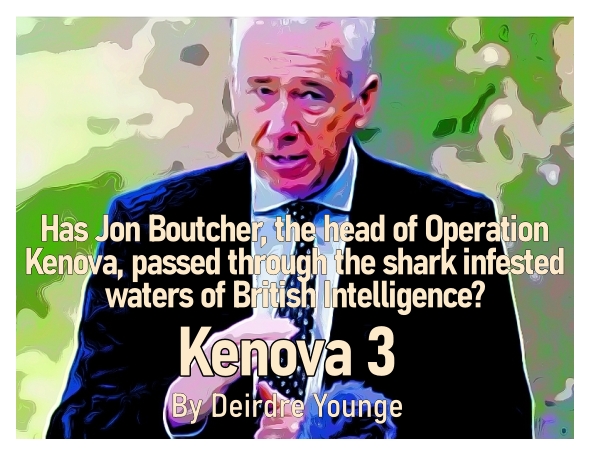Chief Superintendent Jon Boutcher and Operation Kenova’s first report on Agent Steaknife aka Freddie Scappaticci, has now, surprisingly, been approved by the British Cabinet Office without redactions or changes. It is now being considered by the Public Prosecution Service (PPS) of Northern Ireland. Boutcher seems optimistic that the report will be published soon. [Since this article was published Jon Boutcher has been appointed Chief Constable of the PSNI. He says Operation Kenova’s first report is ready for publication by the PSNI but has recused himself from the process. According to the Public Prosecution Service of NI there will be no prosecutions arising from the Operation Kenova investigation into Agent Stakeknife.]
Boutcher and Operation Kenova have passed through shark infested waters. It now seems less likely that the British Government’s legislative guillotine, the Northern Ireland Troubles (Legacy and Reconciliation) Bill, moving through parliament will close down Boutcher’s investigations. On the other hand, there is still the very real prospect of a last minute power grab by the various intelligence agencies.

Boutcher has submitted over 1,000 files to the Public Prosecution Service (N. I.) and more are to follow. The files relate not just to the central ‘Stakeknife’ investigation but other cases which have become part of Operation Kenova’s remit.

Will Jon Boutcher’s Kenova be the first criminal investigation to get to the truth of the British State’s ‘irregular’ clandestine war and its ‘army’ of secret soldiers – the agents and informers, who are allegedly implicated in murders, kidnappings and bombings. Did the ends justify the means in delivering a deeply morally compromised peace?
At the centre of the Kenova mission is an investigation into the notorious Army Intelligence/MI5 agent ‘Stakeknife’ believed to be Freddie Scappaticci. There are other highly sensitive cases in Kenova’s portfolio implicating agents who have allegedly killed more people than Scappaticci. The full exposure of their activities could cause massive reputational damage for many who are now leadership figures on all sides of the conflict.
It was inevitable that Jon Boutcher would face the full force of the British ‘Secret State’ whose powers are extraordinary. We now have an indication of how those forces will line up.
The Cabinet office, representing agencies including MI5, MI6, British Army Intelligence, the PSNI and, of course, the Prime Minister and Government, responded to the circulation of Chief Superintendent Boutcher’s draft protocol. The protocol was simply a description of how Boutcher would deal with the publication of a first report on agent ‘Stakeknife’. That report is now expected shortly. The response in turn from the Cabinet Office (dated November 2021) was published on the Operation Kenova website some months ago. Boutcher’s trenchant responses to points raised were also included in the same document.
This is a detailed look at the Cabinet Office response to Boutcher’s proposed first report and his reply. They give a clear indication of the battle lines.
(The Cabinet office document has been lightly edited for brevity. Italics are mine.)

Security checking
Kenova’s proposal to show a draft report to interested parties before security checking was a red flag as far as the Cabinet Office was concerned:
“As currently drafted, the “representations” stage comes before the “security checking” stage, which seems to us to carry the potential for national security sensitive material to be seen by those it should not. We kindly request that those sections of the draft protocol be reordered/re-drafted to avoid this risk.”
Boutcher’s response
Boutcher explained why security checking had to come after the release of a draft report, to interested parties: In this section he makes his most important point about the separation of powers – that Operation Kenova is a police investigation and therefore independent of government:
“Firstly it is difficult to envisage circumstances in which a draft passage which is critical of a person or body – so as to engage the representations stage could contain sensitive information which is not already known to them (because the criticism would necessarily relate to their conduct). Secondly, if such circumstances were to arise, and the subject of the criticisms were not a public authority already seized of the relevant information, this would be apparent and we would be able to take advice as appropriate. In this regard it must be remembered that we are independent of government, we communicate with others about our work on a regular basis, without submitting every item of correspondence for security checking, and we are experienced in protecting the confidentiality of sensitive information. Thirdly, much of the sensitive information we hold is already subject to legal obligation precluding onward disclosure without the agreement of its originator. Fourthly, paragraph 2.4 of the draft protocol confirms that disclosure at the representations phase “will require and depend upon recipients giving and abiding by undertakings as to confidentiality and onward disclosure.”
Redaction Process
The Cabinet office had a concern about any redactions process which blanks out sensitive information or names in documents:
“We would request that reports just show the material has been removed rather than applying a word for word process of redactions. This would avoid potential disclosure issues and the risk that interested parties could attempt to work out specific redacted words…Similarly, if a closed report is to be shared with any associated groups we would request that KENOVA should ensure members of those groups are suitably vetted/cleared to see the appropriate classification of material.”
Boutcher’s response
Kenova/Jon Boutcher recognised that redactions can, on occasion, be problematic but that is not always the case:
“We will therefore judge the best means for applying and presenting redactions, if any, on a case by case basis. We do not envisage producing any “closed” reports.”
National Security Dispute resolution and NCND
The Cabinet Office asserted that the crucial issue of dispute resolution in matters of national security should be left to Government Ministers and not decided by Kenova itself and that a text to that effect be included in a report. The various intelligence agencies clearly believe it should be left to them, not Kenova, to decide what intelligence material should or should not be published and in what form:
“…it is for Ministers rather than KENOVA to determine whether it is in the public interest to disclose national security information.”
The ‘NCND’ or ‘Neither Confirm Nor Deny’ formulation of words is used as a response to inquiries in matters ‘engaging’ national security in the UK. The Cabinet office believed elements of a future report may…:
“raise issues of ‘Neither Confirm Nor Deny’ (NCND), a principle applied by relevant departments and agencies for National Security issues and owned by the Cabinet Office. If the proposed contents of the reports is likely to engage the NCND principle, then we would request that reference should be made to it in the draft protocol.”
Boutcher’s response
“Firstly I cannot conceive of circumstances in which we would seek to include material which is the subject of a valid national security objection in any report. Secondly, I agree that Kenova cannot determine the validity of such objections and accept that the government’s assessment of them will always deserve special respect and weight by reason of its constitutional responsibilities and expertise. However the government cannot determine the validity of its own actions – only the independent judiciary can do that – and it would not be right to suggest otherwise in the protocol. The Kenova investigations are police investigations which are independent of government and are not subject to any absolute governmental right of veto or censorship. Thirdly, the “neither confirm nor deny” or “NCND” policy is simply one means of protecting sensitive information, which may or may not be relevant to security checking, and I see no need to refer to it in the protocol.”
Legislation references
The Cabinet office wanted to broaden the references to legislation could apply to or govern a report:
“Finally, we would like explicit references to be included…to the Security Services Act 1989, the Intelligence Services Act 1994 and “any other legislation that the Security and Intelligence Agencies might wish to reference”:
Boutcher’s response:
“I have included references to the Security Service Act 1989 and Intelligence Service Act 1994 …However I cannot include the words “or any other legislation that the Security and Intelligence Agencies may wish to reference” because this appears to imply an exclusive right (not enjoyed by others) to refer to unspecified legislation regardless of its relevance…”.
General/resourcing
The Cabinet Office suggested that parts of the draft report be sent to officials for security checking over a period of time rather than as one (complete) final draft. This would put ‘officials’ in position to control the publication of material.
“It takes time to check and consider any national security related material in such reports…Naturally, the more time we are given to review any draft(s) the better……it would be helpful for us to better understand KENOVA’s anticipated timeline for these interim/final reports and how you are planning to engage with the Northern Ireland Public Prosecution Service to ensure their publication does not prejudice any future prosecutorial decisions.”
Boutcher’s response
“My conclusion is that only one pre-publication security checking process is needed – after the representation process – has caused some disquiet within government. In order to assuage this I will provide the Cabinet Office with a strictly confidential copy of each non-government representations pack 10 working days in advance of its formal dispatch. Should the government consider that it would be unlawful for me to send any such pack to a non-government recipient on a confidential basis, it will have an opportunity to take steps to prevent this from happening. I am confident that no such steps will ever need to be taken and the exercise itself will demonstrate that the disquiet was unjustified”.
This is a crucial paragraph and points to what is likely to be a major point of conflict with the various intelligence agencies.

Jon Boutcher is proposing to send a final draft report, unvetted by the Cabinet Office / MI5, to interested parties on a confidential basis. He asserts that the Government cannot be the final arbiter of its own decisions. The most powerful point of principle made by Boutcher, one that will be severely tested, is his reminder that Operation Kenova is a police investigation and therefore independent of the Government and not subject to any “absolute Governmental censorship or veto”.
In reference to NCND the ‘neither confirm nor deny’ formulation – which the Cabinet Office says it “owns” – Boutcher points out it is just one way of protecting sensitive information.
The Cabinet office document signals the ‘Deep State’ stirring and doing what it always does – decide how much or how little intelligence material its citizens can be allowed to see.
Endgame
Jon Boutcher has recently denied that MI5 are attempting to suppress or censor his report on ‘Stakeknife’. But there is no doubt his next moves will be viewed warily by the leadership of Sinn Fein, not just the various intelligence services on both sides of the border. Sources in touch with thinking in ‘Whitehall’ believe the British Government will inevitably stifle Operation Kenova before any report is published. The British Government’s amendments to the Legacy legislation passing through the House of Lords allows for prosecutions on new evidence and penalties for non-cooperation. The bill, when passed, will bring the guillotine down on Operation Kenova which itself provided the model for parts of the bill.
Will Jon Boutcher be another wounded warrior who limps off the battlefield in the war for control of the narrative – truth and justice subordinated to protect those with blood on their hands?

